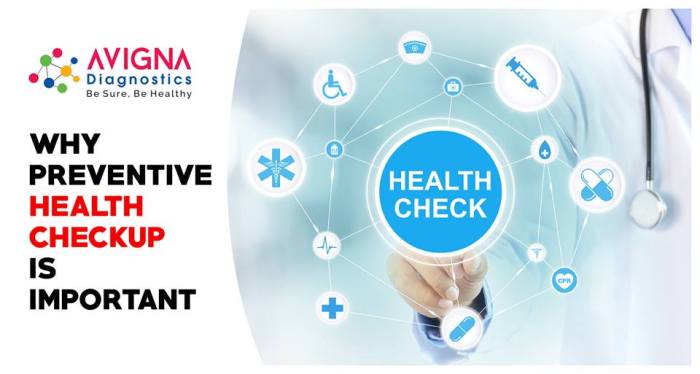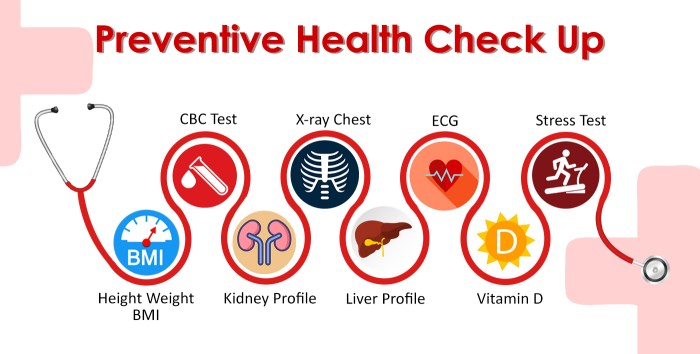Preventive Health Checkups Investing in Your Well-being

Preventive health checkups are more than just routine visits; they’re a proactive investment in your long-term health and well-being. Regular checkups empower you to identify potential health issues early, often before symptoms even appear, leading to more effective and less invasive treatments. This proactive approach not only improves your quality of life but can also significantly reduce healthcare costs in the long run by preventing more serious and costly conditions down the line.
This guide explores the importance, types, and process of preventive health checkups, empowering you to take control of your health journey.
From understanding the different types of checkups tailored to your age and gender to navigating the process of finding a qualified healthcare provider and interpreting your results, we aim to provide a comprehensive resource to help you make informed decisions about your health. We’ll also delve into the integration of holistic health practices and the role of technology in enhancing preventive care, offering a holistic perspective on maintaining optimal well-being.
Holistic Health and Preventive Checkups

Preventive healthcare is evolving beyond traditional disease-focused models, embracing a more holistic approach that considers the interconnectedness of physical, mental, and emotional well-being. This integrated strategy aims to prevent illness and promote overall wellness through proactive lifestyle changes and regular checkups. By addressing the root causes of health issues rather than simply treating symptoms, holistic preventive care empowers individuals to take control of their health journey.
Integrating Holistic Practices into Preventive Care
Holistic health practices, such as mindfulness, yoga, and acupuncture, are increasingly being integrated into preventive care programs. These practices aim to reduce stress, improve sleep quality, and enhance overall well-being. For instance, mindfulness-based stress reduction techniques have been shown to lower blood pressure and improve cardiovascular health, thus contributing directly to preventative healthcare goals. The integration of these practices often involves collaborative efforts between healthcare professionals and complementary practitioners to provide a comprehensive and personalized approach.
The Role of Lifestyle Factors in Preventive Health
Lifestyle factors significantly impact an individual’s health and susceptibility to chronic diseases. A balanced diet rich in fruits, vegetables, and whole grains, coupled with regular physical activity, forms the cornerstone of preventive healthcare. Managing stress through techniques like meditation, deep breathing exercises, or spending time in nature is equally crucial. Chronic stress elevates cortisol levels, weakening the immune system and increasing the risk of various health problems.
By actively addressing these lifestyle factors, individuals can significantly reduce their risk of developing chronic diseases like heart disease, type 2 diabetes, and certain cancers.
Wellness Coaching Support for Preventive Healthcare Goals
Wellness coaching provides personalized guidance and support to individuals aiming to improve their health and well-being. Coaches work collaboratively with clients to set realistic goals, develop action plans, and overcome barriers to achieving their health objectives. For example, a coach might help a client develop a sustainable exercise plan, manage their diet effectively, or implement stress-reduction techniques into their daily routine.
This personalized approach enhances adherence to lifestyle changes, improving the effectiveness of preventive healthcare strategies.
Mind-Body Connection and Overall Health
The mind-body connection is a fundamental concept in holistic health, recognizing the profound influence of mental and emotional states on physical health. Chronic stress, anxiety, and depression can negatively impact the immune system, increase inflammation, and contribute to the development of various health problems. Conversely, positive mental states, such as optimism and resilience, can enhance the immune response and promote overall well-being.
Cultivating a positive mind-body connection through practices like meditation, yoga, or spending time in nature can significantly contribute to preventive healthcare outcomes.
Influence of Holistic Health Aspects on Preventative Care
| Holistic Health Aspect | Impact on Preventative Care | Example | Measurable Outcome |
|---|---|---|---|
| Nutrition | Reduces risk of chronic diseases | Adopting a Mediterranean diet | Lowered cholesterol levels, improved blood pressure |
| Exercise | Improves cardiovascular health, strengthens immune system | Regular cardio and strength training | Increased endurance, reduced body fat percentage |
| Stress Management | Reduces cortisol levels, improves sleep quality | Mindfulness meditation, yoga | Lowered blood pressure, improved mood |
| Mindfulness | Enhances self-awareness, promotes emotional regulation | Daily mindfulness practice | Reduced anxiety levels, improved focus |
Health Technology and Preventive Care

The integration of technology into healthcare has revolutionized preventive care, offering innovative tools and resources to improve individual health management and outcomes. From wearable fitness trackers to sophisticated health apps, technology empowers individuals to take a more active role in maintaining their well-being. This increased accessibility and engagement with preventive measures holds the potential to significantly reduce the burden of chronic diseases and improve overall population health.
Numerous health technologies and applications actively support preventive health practices, offering a range of features designed to encourage healthy habits and early disease detection. These technologies improve access to preventive care by overcoming geographical barriers and scheduling constraints, offering personalized guidance and support, and fostering greater self-awareness and engagement in one’s health journey.
Benefits and Limitations of Technology in Preventive Health
While technology offers significant advantages in promoting preventive health, it’s crucial to acknowledge its limitations. Benefits include increased convenience, personalized health guidance, enhanced monitoring capabilities, and improved access to healthcare resources, particularly for individuals in remote areas or with limited mobility. However, limitations include potential data privacy concerns, the digital divide excluding individuals without access to technology or digital literacy, and the risk of over-reliance on technology without adequate professional medical guidance.
Furthermore, the accuracy and reliability of data collected by some technologies can vary, necessitating critical evaluation of information obtained.
Comparison of Health Technology Options
Several distinct categories of health technology support preventive care. Wearable devices, such as smartwatches and fitness trackers, monitor physical activity, sleep patterns, and heart rate, providing valuable data for assessing overall health and identifying potential risks. Mobile health (mHealth) apps offer personalized health recommendations, medication reminders, and tools for tracking various health metrics. Telehealth platforms enable remote consultations with healthcare providers, facilitating convenient access to preventive services like screenings and consultations.
Finally, sophisticated health management platforms integrate data from various sources to provide a comprehensive overview of an individual’s health status, enabling proactive interventions and personalized care plans. The choice of technology depends on individual needs, preferences, and technological proficiency.
Examples of Health Apps and Their Features, Preventive health checkups
Many apps are available, each offering a unique set of features to support preventive health. Choosing the right app depends on individual needs and preferences. Here are a few examples:
- MyFitnessPal: Tracks calorie intake, macronutrient breakdown, and physical activity levels. Provides personalized dietary recommendations and progress tracking tools.
- Headspace: Offers guided meditation sessions and mindfulness exercises to reduce stress and improve mental well-being. Features include personalized programs and progress tracking.
- Carrot Rewards: Incentivizes healthy behaviors through a points-based reward system. Users earn points for completing health-related tasks and can redeem these points for various rewards.
- One Drop: Provides personalized support for individuals managing chronic conditions such as diabetes. Features include glucose monitoring, medication reminders, and communication with healthcare professionals.
- BetterSleep: Analyzes sleep patterns using smartphone sensors and provides personalized recommendations for improving sleep quality. Offers guided sleep meditations and soundtracks.
In conclusion, prioritizing preventive health checkups is a crucial step towards a healthier and longer life. By proactively addressing potential health concerns, individuals can significantly reduce their risk of developing serious illnesses, improve their overall quality of life, and potentially save substantial healthcare costs. Empowering yourself with knowledge and taking control of your health journey through regular checkups is an investment that yields invaluable returns.
Remember to consult with your healthcare provider to develop a personalized preventive care plan that aligns with your specific needs and health goals.
Questions Often Asked: Preventive Health Checkups
What if I have no health insurance?
Many community health centers and clinics offer affordable or sliding-scale fees based on income. Explore options for financial assistance programs available in your area.
How often should I get a preventive checkup?
Frequency varies based on age, gender, family history, and existing health conditions. Your doctor will recommend a schedule tailored to your individual needs.
What should I do if I receive abnormal test results?
Schedule a follow-up appointment with your doctor to discuss the results, potential next steps (further testing or treatment), and any concerns you may have.
Can I bring a friend or family member to my checkup?
Generally, yes. It’s advisable to discuss this with your healthcare provider beforehand to ensure it aligns with their policies and the nature of the appointment.




